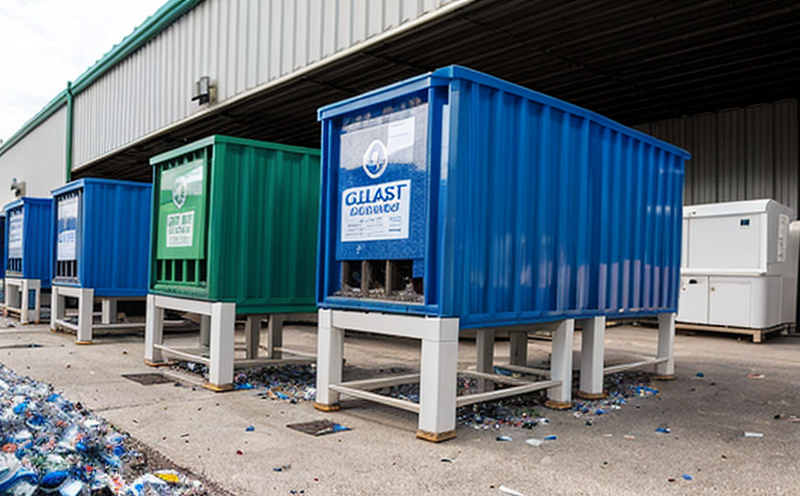EN 12930 Ceramic Waste Compression Strength
The European Standard EN 12930 specifies the method for determining the compressive strength of ceramic waste materials. This standard is crucial in ensuring that recycled ceramics meet quality and safety requirements, thereby facilitating their reuse in various applications. The test is particularly important for sectors such as construction, where recycled materials are increasingly used to reduce landfill waste and energy consumption.
The compression strength test involves compressing a specimen of ceramic waste until it fails under load. The standard provides detailed instructions on how to prepare the specimens, including sizing them according to specific dimensions that reflect real-world applications. This ensures that the results obtained are relevant to practical use cases in the sector.
One of the key aspects of EN 12930 is its emphasis on accuracy and precision. The test setup includes a compression testing machine capable of applying controlled loads to the specimens. The specimen preparation process involves careful consideration of factors such as moisture content, temperature, and curing time, which can significantly affect the test results.
Once prepared, the specimens are placed in the testing machine and subjected to gradually increasing compressive forces until failure occurs. The force at which the specimen fails is recorded, providing a measure of its compressive strength. This value is then used to evaluate the material's suitability for recycling into new products.
Compliance with EN 12930 ensures that ceramic waste materials are safe and reliable for use in construction and other industries. It helps identify any potential weaknesses or issues within the recycled materials, allowing manufacturers to make necessary adjustments before production. This standard also supports environmental sustainability by promoting the recycling of valuable resources.
The test results play a critical role in product development and quality assurance processes. Engineers and quality managers can use these data points to optimize ceramic waste processing methods and improve material properties. By adhering to this standard, industries can contribute positively to reducing environmental impact while maintaining high standards of safety and performance.
International Acceptance and Recognition
The EN 12930 standard has gained widespread acceptance across Europe and beyond. Its rigorous methodology ensures that ceramic waste compression strength measurements are consistent, reliable, and comparable worldwide. This recognition is vital for international trade in recycled materials, as it fosters trust among buyers and sellers.
Many countries have adopted EN 12930 as a national standard or recommended practice. The acceptance of this standard reflects the growing global commitment to sustainable waste management practices. By aligning with international standards like EN 12930, industries can ensure that their products meet global quality and safety benchmarks.
The standard's widespread adoption also promotes consistency in testing methodologies across different regions. This uniformity is essential for facilitating cross-border trade and collaboration between researchers and manufacturers. It allows for the seamless exchange of data and best practices, enhancing overall industry standards.
Adherence to EN 12930 not only ensures compliance with regulatory requirements but also demonstrates a company's commitment to environmental responsibility and quality assurance. This can be particularly beneficial in gaining market share and building long-term relationships with customers who prioritize sustainable business practices.
Environmental and Sustainability Contributions
- Reduction of Landfill Waste: By recycling ceramic waste, we significantly reduce the amount of material sent to landfills. This practice helps alleviate environmental pressures associated with disposal.
- Energy Savings: Recycled ceramics require less energy to produce than virgin materials, contributing to overall energy efficiency and reduced carbon emissions.
- Resource Conservation: Reusing ceramic waste conserves raw materials, reducing the need for mining and processing new resources.
- Biodiversity Protection: By minimizing landfill use, we help protect ecosystems from the adverse effects of improper disposal practices.
Competitive Advantage and Market Impact
Compliance with EN 12930 provides a competitive edge in the market by ensuring that products meet high-quality standards. This can lead to increased customer confidence, enhanced brand reputation, and better sales performance.
By demonstrating commitment to sustainability through practices like ceramic waste recycling, companies can attract environmentally conscious consumers who prioritize ethical business practices. This can result in a loyal customer base and positive media coverage, further boosting market presence.
The ability to provide consistent test results according to international standards also enhances credibility among industry peers and regulatory bodies. This can lead to increased collaboration opportunities and potential for innovation within the sector.
Moreover, adhering to such a standard allows companies to stay ahead of legislative changes related to waste management and recycling. By being proactive in adopting best practices now, firms position themselves as leaders in sustainable manufacturing processes.





